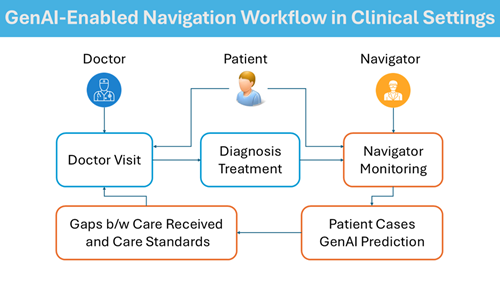Navigation
GenAI-enabled Navigation
In healthcare, a navigator plays a critical role in helping patients navigate the complex healthcare system, ensuring they receive timely, high-quality, and coordinated care. While navigators traditionally focus on care coordination, patient education, health system navigation, and advocacy for shared decision-making, their ability to support disease-specific navigation has been limited due to its complexity.
Now, powered by GenAI on the ELHS platform, navigators are empowered to take on the role of disease navigation more effectively—routinely monitoring the quality of care patients receive and identifying potential gaps that patients can act on. This enables a faster, more informed journey toward timely screening, diagnosis, and treatment—anywhere in the world.
ELHS Simulated GenAI-enabled Navigation Services

Patients
1. Input health records from each doctor visit (automatic EHR integration coming soon).
2. Learn from navigator feedback and take action by discussing gaps with their doctors.

Navigators
1. Create a patient case after each new record is submitted.
2. Use the built-in ELHS LLM to predict diseases and compare them to the actual care received.
3. Identify potential gaps and provide clear action points for patients.

Patient Benefits
1. Learn from a library of simulated patients based on published real-world case studies.
2. Demonstrates the potential benefits of GenAI in disease screening, early diagnosis, and personalized treatment.
We have developed the first simulated GenAI-enabled ELHS unit for navigation on the ELHS platform. The simulation is powered by synthetic patient records and continuously improved using new synthetic data. Both patients and navigators can use this simulated system to experience how GenAI can be applied to monitor care quality, identify suboptimal cases, and accelerate accurate and timely diagnosis and treatment.
At the core of the system is the ELHS LLM—a fine-tuned, high-performance open-source large language model designed to accurately predict a broad range of diseases, including cancers and neurological conditions. Accurate disease prediction enables automated comparison between the care patients received and evidence-based standards of care.
The U.S. National Academy of Medicine (NAM) has recommended the routine monitoring of every care encounter. However, progress has been slow due to several barriers, including lack of standardized diagnostic monitoring tools for all diseases, lack of financial incentives, cultural and organizational resistance to change.
The GenAI-enabled navigation process addresses these challenges by empowering the ultimate beneficiaries—patients themselves—to clearly see the care monitoring results provided by navigators. This transparency motivates patients to engage in informed conversations with their doctors about any deviations from the high standards of care predicted by GenAI.
GenAI Empowering Navigators in Clinics Worldwide
The ELHS navigation system is also designed to meet the need for a high-accuracy, low-cost GenAI tool for navigators working with clinics in low-resource settings. This enables healthcare providers around the world to responsibly deploy the LLM-based system within their controlled environments, allowing navigators and patients to use GenAI to monitor the quality of care. The core LLM in the ELHS unit can be further fine-tuned with local patient data to optimize the accurate prediction of diseases commonly encountered in local populations. The ultimate goal of the GenAI-enabled navigation process is to support timely screening, diagnosis, and treatment—ultimately improving patient outcomes.

Patient health records are either automatically integrated or manually submitted via a web interface. After each doctor visit: 1. A navigator creates a patient case. 2. GenAI predicts the expected care trajectory. 3. The navigator compares the patient's actual care (screening, diagnosis, treatment) to the GenAI-generated standard. 4. If a gap is found, the navigator recommends specific action points. 5. The patient reviews the insights and decides whether to discuss the findings with their doctor. 6. This process can trigger timely improvements in care or corrections of potential medical errors.
Contact us (login required), or email support@elhsi.org directly if you are interested in deploying this navigator tool in your clinic.